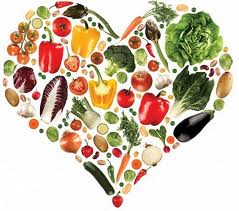“Let thy food be thy medicine and medicine be thy food.” Hippocrates, father of modern medicine
We know that adopting a plant-based diet is growing and it’s been said that this trend will upward continue over the next decade. The concept that a plant-based will result in reducing and even eliminating disease and the medications and surgery that go with it, is so powerful that it is bewildering that people aren’t running in droves to their markets to load up on fruits and vegetables and whole grains.
 When you go for a medical check-up or physical, does your doctor ever mention that what you eat and what you don’t eat affects your health tremendously? When you feel sick or are in the midst of battling chronic illness or disease, does your doctor instruct you in the benefits of eating a more plant-based diet or does he simply write you another prescription and say,”let’s see if this helps?” If the answer to these questions is no, then the bigger question becomes, have our doctors been instructed on how to teach their patients about plant-based diets and how they can literally reverse disease by encouraging patients to adopt it?
When you go for a medical check-up or physical, does your doctor ever mention that what you eat and what you don’t eat affects your health tremendously? When you feel sick or are in the midst of battling chronic illness or disease, does your doctor instruct you in the benefits of eating a more plant-based diet or does he simply write you another prescription and say,”let’s see if this helps?” If the answer to these questions is no, then the bigger question becomes, have our doctors been instructed on how to teach their patients about plant-based diets and how they can literally reverse disease by encouraging patients to adopt it?
The scientific research is available so why aren’t so many of our doctors giving us this very important medical information? Is it possible that they just don’t know? A team of healthcare professionals have issued a new, very exciting, special report about the benefits of plant-based diets, using case studies and a multitude of medical references. This is a call to action, written by doctors for doctors, and has been published by The Permanente Journal in their Spring, 2013 Volume 17 No. 2.
“Nutritional Update for Physicians: Plant-Based Diets” should be mandatory reading for doctors and patients alike. Please read this article because, although it’s geared for doctors, the explanations and the supporting evidence is simple to understand, yet quite powerful. Whether your doctor reads this report or not, you will be arming yourself with the most important information that you need, learning more about “the best but perhaps the least common diets recommended over the last few decades to turn the tide of chronic illnesses.” The context of the article is the concern for rising cost of healthcare in the wake of the spread of obesity, diabetes and cardiovascular disease and proves that physicians should consider recommending a plant-based diet to all their patients, especially those suffering from these diseases.
As a dramatic example of how effective a plant-based diet can improve one’s health, the article begins with the description of a case study of a 63-year-old man diagnosed with Type 2 diabetes, high blood pressure, high cholesterol, as well as complaints of fatigue, nausea and muscle cramps. Over a 16-week period of a doctor-prescribed, low-sodium, plant-based diet and 15 minutes of exercise a day, the patient experienced significantly lower blood pressure and lower cholesterol. He was able to wean himself off of 4 medications and reduce the dosages of 2 more! The report concludes that the dramatic improvements appear to be related to the quality of his new diet.
The article goes on to explain the differences between many of the terms that we throw around: vegan, vegetarian and plant-based, and all the lacto & ovo variations within these categories. Interestingly, it clearly makes a statement that “vegetarian or vegan diets adopted for ethical or religious reasons may or may not be healthy.” The details of the plant-based diet adopted are very significant when determining the potential benefits to better health. These details determine the quality of a vegan diet and are critical if you are concerned with your health.
The “meat” of the report (and I use that term figuratively) is how it uses the many existing research studies to demonstrate the benefits of plant-based diets. With a full page of footnotes and citations, the proof of their claims seems convincingly clearcut to me as a layman. The highlights of these findings are itemized as follows:
Obesity
• five studies show that a “vegan or vegetarian diet is highly effective for weight loss.”
• a “vegan diet caused more calories to be burned after meals in contrast to nonvegan diets”
• “vegetarians were found to consume more magnesium, potassium, iron, thiamine, riboflavin, folate and vitamins and less total fat”
• vegetarians are slimmer than their meat-eating counterparts
• there is a positive association between meat consumption and obesity
• “a plant-based diet seems to be a sensible approach for the prevention of obesity in children.”
Diabetes
• “vegetarians have approximately half the risk of developing diabetes as nonvegetarians.”
• “43% of people on the low-fat vegan diet were able to reduce their medication, compared with 26% of those on the American Diabetes Assoc. diet”
• “a low-fat, plant-based diet with no or little meat may help prevent and treat diabetes, possibly by improving insulin sensitivity and decreasing insulin resistance”
Heart Disease
• one study showed that 82% of patients diagnosed with heart disease had some level of regression of atherosclerosis after 1 year of a plant-based regimen
• in another study, on the Mediterranean diet, a group of patients experienced a 73% decrease in coronary events and a 70% decrease in all-cause mortality
High Blood Pressure
• “vegetarian diets were associated with lower systolic blood pressure and lower diastolic blood pressure”
• “a Japanese diet (low sodium and plant-based) significantly reduced systolic blood pressure”
Mortality
• “plant-based diets were associated with reduced risk of cardiovascular disease and mortality compared with non-plant-based diets”
• “low meat intake has been associated with longevity”
• seven studies with a combined total of 124,7066 participants found that vegetarians had 29% lower ischemic heart disease mortality than non-vegetarians
The report also talked about the basic concerns that doctors, patients and the general population may have about adopting a plant-based diet for health benefits. Scientific studies provide the evidence and advice, as well, and the main conclusions are:
Protein
• “generally patients on a plant-based diet are not at risk for protein deficiency” and a “well-balanced plant-based diet will provide adequate amounts of essential amino acids”
• “soybeans and foods made from soybeans are good sources of protein and may help lower levels of LDL in the blood and reduce the risk of hip fractures and some cancers”
• “women with breast cancer who consumed soy products had a 32% lower risk of breast cancer recurrence and a 29% decreased risk of death”
• “men showed a 26% reduction in prostate cancer risk with increased intake of soy”
• “overly processed, soy based meat substitutes may not be as healthy as less processed soy products like tofu, tempeh and soy milk”
Iron
• “iron-deficiency anemia is rare even in individuals who follow a plant-based diet”
• “plant-based diets contain iron but the iron in plants has a lower bioavailability than the iron in meat”
• “plant-based foods rich in iron: kidney beans, black beans, soybeans, spinach, raisins, cashews, oatmeal, cabbage and tomato juice”
Vitamin B12
• Vitamin B12 is produced by bacteria, not plants or animals, and is vital for blood formation and cell division
• people following a plant-based diet may need to supplement with vitamin B12
Calcium and Vitamin D
• studies have shown that fracture risk was similar for vegetarians and nonvegetarians
• significant sources of calcium: tofu, mustard and turnip greens, bokchoy and kale
• Vitamin D deficiency is common in the general population and plant-based prducts such as soymilk and cereal grains may be fortified to provide an adequate source of Vitamin D or supplements may be recommended
Fatty Acids
• “the fatty acids that vegans are most likely to be deficient in are the omega-3 fats and alpha-linolenic acid and good sources are flax seeds, flax oil, walnuts and canola oil”
The conclusion of the article is particularly strong in its recommendations to physicians:
• a healthy, plant-based diet requires planning, reading labels and discipline
• the major benefits are reducing the number of medications they take to treat a variety of chronic conditions, lower body weight, descreased risk of cancer and a recution in their risk of death from ischemic heart disease
• it is a way of life that is tailored to the individual and the benefits realized will be relative to the level of adherence and the amount of animal products consumed
• physicians should advocate that it is time to get away from terms like vegan and vegetarian and start talking about eating healthy, whole, plant-based foods
• a registered dietician should be part of the health care team that designs a plant-based diet for patients with chronic disease on multiple medications
• physicians need to work together to create a societal shift toward plant-based nutrition
• further research is needed to find ways to make plant-based diets the new normal
• healthcare teams should be knowledgable about plant-based nutrition and complete a course on healthy eating and active living
• emphasis should be on prevention of chronic disease by changing how we eat
After reading the article, if you feel bold enough to print it and bring it to your physicians, we can get one step closer to prevention of illness and better overall health with the guidance of physicians educated in plant-based nutrition!
Click here to read about the amount of study in nutrition by students in our country’s medical schools.
xox Ellen








The statistics in the Permanente Report are stunning! This report is so crucial and gives me hope that the medical community will continue to take steps in the right direction.
Maybe doctors will listen to their colleagues, these doctors, who have organized the scientific proof into a well-thought out and written report. The report actually mentioned that there are also studies showing “a willingness of the general public to embrace” plant-based diets. People put alot of faith in what their doctors instruct them to do and if more doctors recommended eating plant-based, more people would adopt it!
Great post Debby,, most doctors don’t care about nutrition, only pills! It is mostly up to independent health-oriented individuals to do the work of educating people!!!!!
Ellen wrote this amazing recap of the Kaiser Permanente report which is a huge step in the right direction! I actually forwarded a link to the report to a few of my doctor friends.
Helen, isn’t it crazy that while you’re discussing your ailment with your doctor, he’s actually reaching for his prescription pad?? If more doctors educated themselves in plant-based nutrition and medicine, they wouldn’t run to prescribe the drugs so fast.